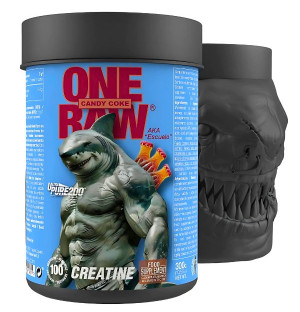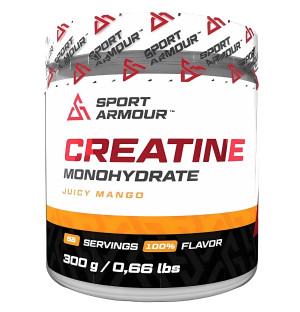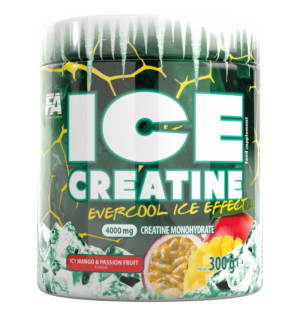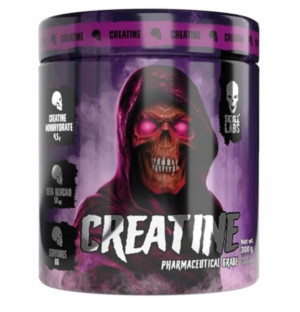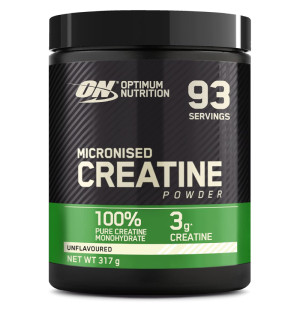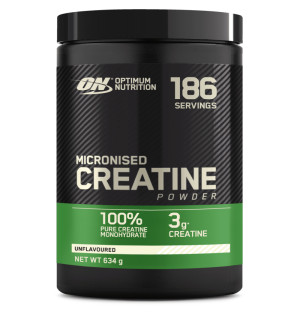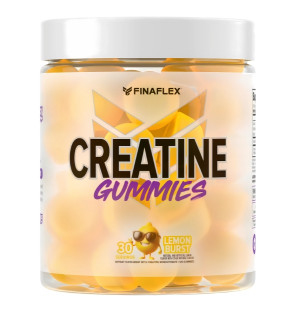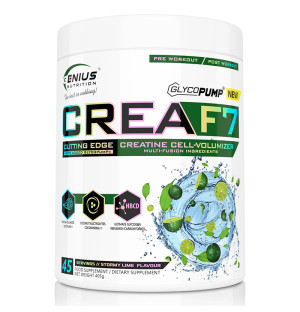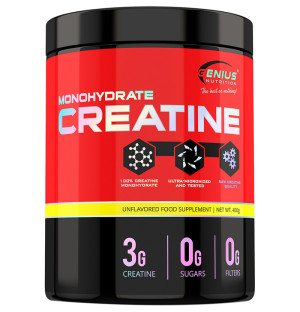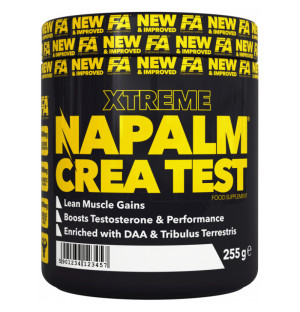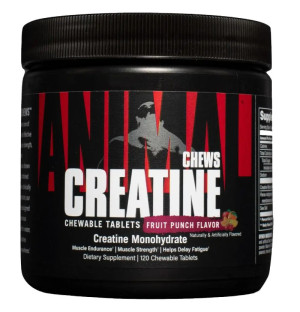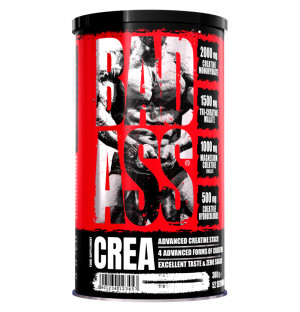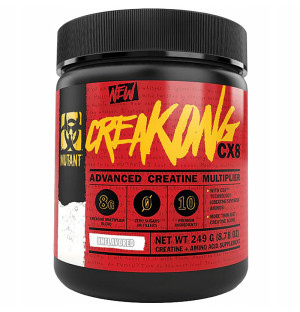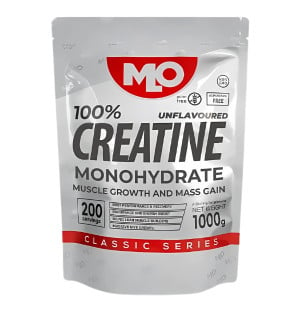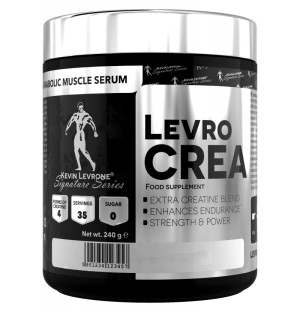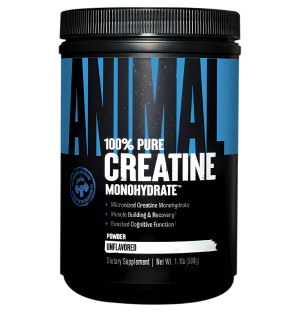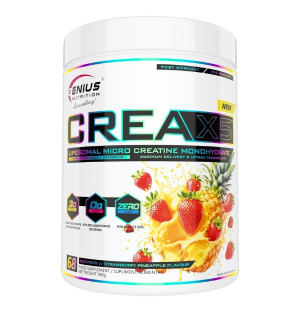Creatine monohydrate
In the market of dietary supplements for athletes and physically active individuals, creatine monohydrate occupies a special place. For years, it has been the cornerstone of support for various sports disciplines, both among amateurs and experienced professionals. Its popularity stems from well-documented effectiveness and a favorable safety profile.
What is Creatine Monohydrate?
Creatine is a compound scientifically known as β-methylguanidinoacetic acid. It is naturally produced in the human body, primarily in the kidneys and liver, with the involvement of three amino acids: arginine, glycine, and methionine. After synthesis, creatine is transported via the bloodstream to the muscles, primarily to skeletal muscles, where it plays a key role in energy metabolism.
Creatine monohydrate (also known as monohydrate) is the most popular form of creatine supplementation. Biochemically, it is a molecule of creatine bound to a water molecule in a 1:1 ratio. It is the most thoroughly researched form of creatine in the world – the vast majority of studies confirming training and health benefits have been conducted using the monohydrate form.
What Does Creatine Monohydrate Consist Of?
High-quality creatine monohydrate should primarily contain pure creatine bound with water. In some cases, manufacturers enhance the formula with additional ingredients such as magnesium or vitamin B6, but the main component remains creatine itself. The recommended daily dose is usually 3-5 g of pure creatine.
Types and Forms of Creatine
There are many different forms of creatine available on the market, but monohydrate remains the most extensively researched and highly recommended option:
- Creatine Monohydrate (Standard) - the basic form characterized by good absorption and an affordable price
- Micronized Creatine Monohydrate - subjected to micronization, making it easier to dissolve
- Buffered Creatine Monohydrate (Kre-Alkalyn®) - more resistant to the effects of low stomach pH
- Creatine Malate - an alternative for people with gastrointestinal issues
- Creatine Hydrochloride (HCL) - characterized by increased solubility and absorption
How Does Creatine Monohydrate Work?
The primary function of creatine in the body is related to its participation in the process of resynthesizing adenosine triphosphate (ATP) - the basic energy carrier in cells. In short:
- Creatine is phosphorylated, converting into phosphocreatine stored in the muscles
- During intense exercise, the body rapidly depletes its ATP reserves
- Phosphocreatine supplies the phosphate residues necessary for the replenishment of ATP
- This enables the muscles to continue working at high intensity for a longer period
This mechanism is particularly important during short, intense efforts such as sprinting, weightlifting, or performing sets of repetitions at the gym.
Effects and Benefits of Using Creatine Monohydrate
Training Benefits:
- Increased muscular strength and power - creatine allows for more repetitions or the lifting of heavier weights
- Support for muscle mass building - enhances muscle protein synthesis and causes cell volumization
- Improved performance during intense exercise - increases physical endurance during short, high-intensity efforts
- Faster recovery between sets - reduces the time needed for recovery
- Decreased myostatin levels - lowers the level of a protein that inhibits muscle growth
Health Benefits:
- Neuroprotective effects - protects nerve cells, which may help in the prevention of neurodegenerative diseases
- Improved glycemic control - favorably influences carbohydrate metabolism
- Strengthening of bones - supports bone mineralization and increases osteoblast activity
- Antioxidant and anti-inflammatory effects - reduces markers of inflammation
- Support for cognitive functions - may improve memory functions, especially in older individuals
Who Should Use Creatine Monohydrate?
- Competitive athletes, particularly in disciplines that require strength and power
- Individuals training recreationally at the gym
- People in the muscle mass building phase
- People during fat loss phases
- Elderly individuals (to help maintain muscle mass)
- Vegetarians and vegans (to supplement the creatine naturally found in meat)
How to Use Creatine Monohydrate?
Constant Supplementation Strategy (Recommended)
Take 3-5 g of creatine daily, at any time of day. Effects become noticeable after approximately 3-4 weeks of regular use.
Loading Phase Strategy
- Loading Phase: 0.3 g of creatine per kg of body weight daily for 5-7 days
- Maintenance Phase: 3-5 g of creatine daily
Practical Tips:
- The timing of intake is not crucial (before/after training or during the day)
- Creatine should be taken on non-training days as well
- It can be combined with other supplements (beta-alanine, citrulline, BCAAs, etc.)
- There is no need to take breaks from supplementation
Creatine Monohydrate - Product Forms
- Powder - an economical form, easy to dose, and can be mixed with other supplements
- Capsules - a convenient form, easy to carry
- Tablets - similar advantages as capsules
Safety and Side Effects
Creatine monohydrate is one of the safest and best-researched supplements on the market. Potential side effects:
- Gastrointestinal issues - at high doses (especially during the loading phase)
- Water retention in muscle cells - may lead to an increase in body weight by 1-2 kg
- Impact on test results - may raise blood creatinine levels
- Potential effect on aerobic performance - due to the increase in body mass
Contraindications:
- Kidney diseases - consultation with a doctor is advised
- Hypertension - consultation with a doctor is advised
- Consideration of weight gain in sports with weight categories
Frequently Asked Questions (FAQ)
Is creatine monohydrate a steroid?
No. Creatine is a naturally occurring compound in the body, and its supplementation is legal and safe.
Does creatine monohydrate cause water retention and bloating?
Creatine causes water to flow into muscle cells (not subcutaneously), which makes the muscles appear more "pumped." It does not cause bloating.
When is the best time to take creatine monohydrate?
The timing of intake is not crucial. Regularity of use is the most important factor.
Is it necessary to take breaks from creatine supplementation?
No, studies confirm the safety of long-term supplementation.
Is creatine monohydrate effective for everyone?
The response to supplementation may vary. Approximately 20-30% of the population are "non-responders" who experience fewer benefits.
Why Should You Buy Creatine Monohydrate at GymHub.pro?
At GymHub.pro, we offer only high-quality supplements with creatine monohydrate:
- Produced in certified laboratories
- Tested for contaminants and heavy metals
- Containing the exact amount of pure creatine declared on the label
- Available in various forms (powder, capsules, tablets)
- Offered at competitive prices while maintaining the highest quality
Legal Disclaimer
The information provided in this description is for educational purposes only and does not constitute medical advice. Dietary supplements, including creatine monohydrate, cannot be used as a substitute for a varied diet. Before starting any supplementation, we recommend consulting with a doctor or nutritionist. Keep out of reach of children. Do not exceed the recommended daily intake.
GymHub.pro is not responsible for the effects of improper use of the products offered. The results of supplementation may vary depending on individual characteristics.

